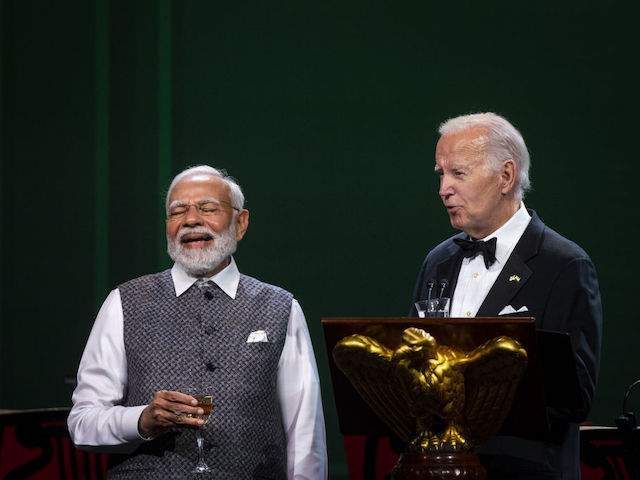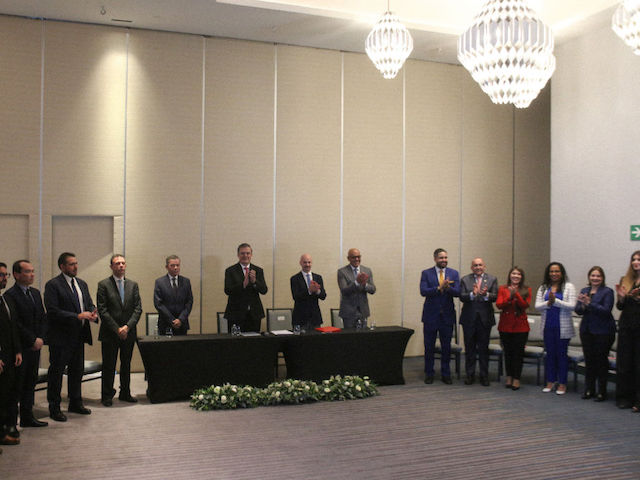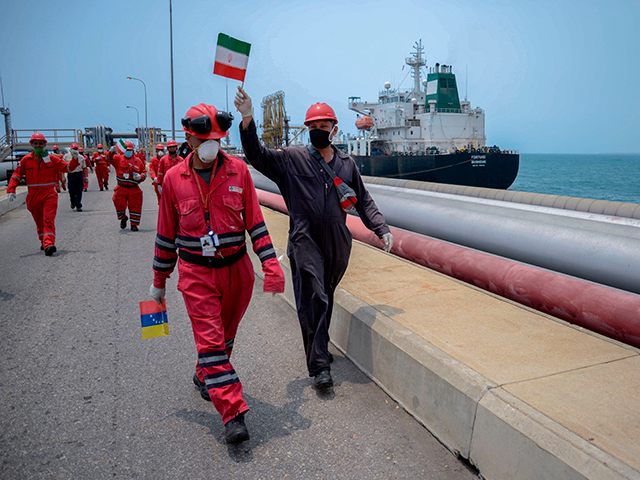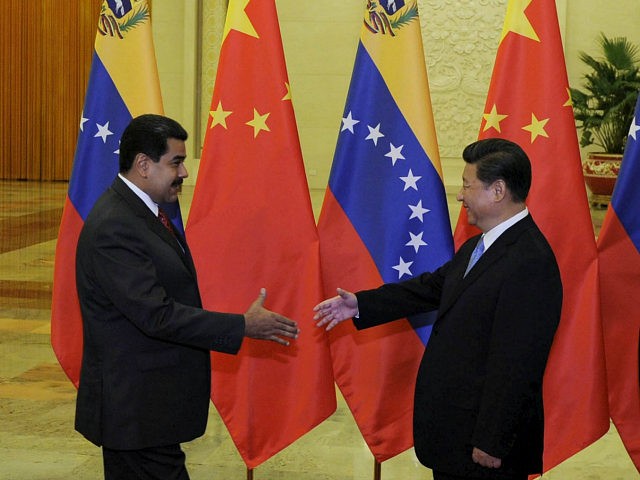CARACAS, Venezuela — The Venezuelan socialist Maduro regime is expecting a substantial increase in its oil exports in 2024 after President Joe Biden eased oil sanctions on the rogue socialist regime in October.
Biden’s decision to overturn sanctions limiting the activities of state-owned Petróleos de Venezuela (PDVSA), imposed on dictator Nicolás Maduro in response to a litany of human rights abuses against anti-socialist Venezuelans, has triggered a mad dash to purchase cheap Venezuelan oil around the world, from fellow rogue regimes such as China to nominal American allies like India.
The sanctions relief package allows PDVSA to once again sell its oil in international markets for a period of at least six months, with the possibility of further extending it past the original six-month period.
The Maduro regime, availed of the oil and gas sanctions relief package, has already signed several agreements with countries such as China and India to sell oil. Nations such as Spain and France have also reactivated joint ventures to expand oil and gas production in the South American country, opening revenue streams for the authoritarian regime.
Reports published on December 19 indicate that China’s state-owned Sinochem Corporation has agreed to purchase at least one million barrels of Venezuelan crude oil. India, an erstwhile importer of Venezuelan crude oil, announced earlier in December that it will once again resume purchasing Venezuelan oil now that the sanctions imposed by the United States on PDVSA are lifted.

U.S. President Joe Biden, right, and Narendra Modi, India’s prime minister, during a state dinner at the White House in Washington, DC, on June 22, 2023. (Al Drago/Bloomberg)
Similarly, PDVSA signed an agreement with Spanish energy conglomerate Repsol last week to reactivate Petroquiriquire, a Venezuela-based joint oil venture company that Repsol holds a 40-percent stake in. Maduro met with Repsol representatives shortly after the agreement was signed.
#EnVivo 📹 | Reunión de trabajo con Directivos de REPSOL. https://t.co/JfpvWAbYq6
— Nicolás Maduro (@NicolasMaduro) December 19, 2023
In November, PDVSA signed an agreement with French energy company Maurel & Prom to expand oil and gas output at their joint ventures located in western Venezuela.
Venezuela holds the world’s largest proven oil reserves, estimated at over 300 billion barrels of oil. As such, oil is the nation’s main industry and export product. The socialist Maduro regime is highly dependent on the nation’s oil revenue for its continued existence.
The United States, during the administration of former President Donald Trump, imposed oil sanctions on PDVSA in 2019 as a response to the Maduro regime’s years of continued human rights violations.
The Biden Administration, following a series of negotiations held in Barbados between representatives of the Maduro regime and representatives of Venezuela’s “opposition” Unitary Platform coalition, awarded the Maduro regime a generous oil and gas sanctions relief package lifting, at least temporarily, the Trump sanctions.

The government of Mexico resumed the Dialogue and Negotiation process between the Government of Bolivarian Republic of Venezuela and the Unitary Platform of Venezuela facilitated by Norway in Mexico City, Mexico on November 26, 2022. (Silvana Flores/Anadolu Agency via Getty Images)
In return, Maduro and his regime pledged in a series of vague promises to hold a “free and fair” presidential election sometime during the second half of 2024. These promises are something that, so far, neither Maduro nor the Venezuelan government institutions — all of which are in the complete control of the ruling United Socialist Party of Venezuela (PSUV) — have shown any interest in upholding.
In the weeks following the sanctions relief package, the Maduro regime instead nullified the results of the Venezuelan opposition’s self-organized primary election, doubled down on persecuting political dissidents, and threatened to annex the Essequibo region, a territory comprising two-thirds of neighboring Guyana.
Thanks to sanctions relief, the Maduro regime is foreseeing a 27-percent increase in PDVSA-derived income in the regime’s 2024 budget.
Biden had already moved to help Venezuela expand its influence in the oil industry prior to October, issuing a license to California-based Chevron in November 2022 that allowed Chevron to resume oil production in Venezuela and sell Venezuelan oil in U.S. markets.
Chevron’s license has been reportedly instrumental in both a 113-percent growth in trade between Venezuela and the United States and Venezuela being able to “stabilize” its oil exports to levels not seen since 2020.
Chevron is also reportedly planning to add at least two new oil rigs in Venezuela, seeking to increase its Venezuelan oil output to 200,000 barrels per day (bdp) by the end of 2024.
The Maduro regime, after nearly 25 years of socialist mismanagement, left PDVSA’s infrastructure on the brink of total ruin. As a result, Venezuela saw its oil output dramatically drop to historic lows in 2020.

A worker of the Venezuelan state oil company PDVSA waves an Iranian flag as the Iranian-flagged oil tanker Fortune docks at the El Palito refinery in Puerto Cabello, in the northern state of Carabobo, Venezuela, on May 25, 2020. (-/AFP via Getty Images)
In 2023, the Maduro regime enlisted the aid of close anti-U.S. ideological ally Iran to repair the Paraguaná Refining Center, Venezuela’s largest refining complex and the world’s second-largest refinery. Reopening the refinery could help Venezuela reduce reliance on the U.S. technology originally used to build and operate the facility.
Paraguaná’s repair works occurred months after Iran finished helping Venezuela repair the smaller El Palito refinery in October 2022. Since then, the Islamic regime has been refining upwards of 100,000 barrels per day of its own oil in the Venezuelan refinery.
The sanctions relief awarded to the Maduro regime also came at a time when Iran, together with Venezuela and Syria, are ramping up plans to build an oil refinery in the Syrian town of Homs.
If successfully built, the proposed Homs oil refinery would be able to process 140,000 barrels per day, which will result in a significant boost to production and yield further profits for the three allied authoritarian regimes.
The Maduro regime claimed that PDVSA’s oil output rose by 15,000 bdp in November, reaching a total output of 801,000 bdp during that month. The Maduro regime has also recently claimed that it is projecting to raise its output and produce more than 1 million bdp in 2024 — an amount that Venezuela was last able to achieve in 2021.
The 1 million barrels-per-day (bpd) goal that the Maduro regime hopes to reach by 2024 is significantly short of the 2 million Maduro promised OPEC Venezuela would produce in 2022, and even less than the 3.5 million bdp Venezuela was able to produce in 1998 before the arrival of the socialist revolution in February 1999.
Over the past two decades, the Venezuelan socialist regime – first under late dictator Hugo Chávez and now under Nicolás Maduro — has used Venezuelan oil to spread its influence across the region and beyond, with preferential regional oil programs such as Petrocaribe, or by providing allies such as the Cuban communist Castro regime with oil shipments in exchange for slave doctor labor and other forms of ideological cooperation.
Christian K. Caruzo is a Venezuelan writer and documents life under socialism. You can follow him on Twitter here.

COMMENTS
Please let us know if you're having issues with commenting.